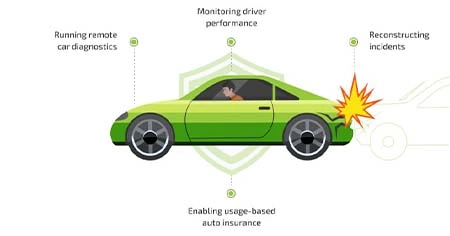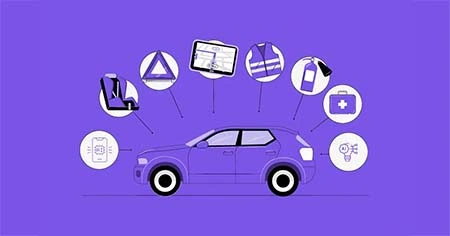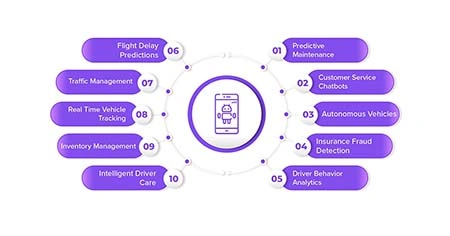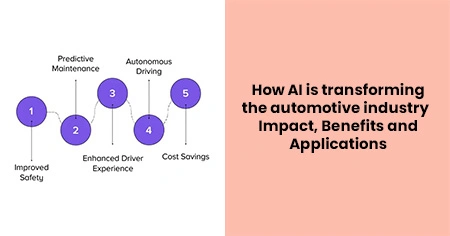A recent McKinsey & Company report projects that the global market for AI in automotive software development services applications would be worth $462 billion by 2030. This spike demonstrates AI's transformational power in reshaping how we design, produce, and interact with cars.
This cutting-edge technology is transforming several industries, with the automotive industry at the vanguard of this transformation. Leading AI automotive software development services are integrating it into their operations, utilizing its potential to gain a competitive advantage and provide customers with exceptional, tailored experiences.
This article delves into AI's impact on the automotive industry, looking at how it can increase safety, efficiency, and customization of the driving experience, all while paving the road for an intelligent car future.
Benefits of AI in the Automotive Industry

From optimizing operations to increasing consumer experience and opening up new technological innovation channels, AI paves the way for automotive greatness. Let us explore the incredible benefits that AI is providing to this market, concentrating on company efficiencies, client retention, and technological improvements from a futuristic perspective.
Enhanced safety
The car sector can apply artificial intelligence to improve the safety of production workers and drivers.
Let's start with the production personnel. Production lines can be monitored for potential safety hazards using computer vision technology, a type of artificial intelligence that allows machines to see as humans do. For example, computer vision can monitor the positioning of automotive software developer or worker and immediately turn off machines if a body part becomes too close to specific mechanisms. Furthermore, using prior maintenance data, AI can forecast when equipment will likely fail, raising safety problems (more on later).
Regarding driver safety, artificial intelligence can be integrated into vehicle computer systems. Again, using computer vision, AI in cars may detect risks, diagnose mechanical and computational flaws within the vehicle, and respond accordingly. This might be as easy as telling the driver to stop at the nearest garage or as complicated as changing the car's setup settings.
AI has the potential to significantly reduce automotive accidents. Autonomous vehicles experience 2.3 times fewer crashes per 4.62 million kilometres than conventional vehicles.
Grow loyalty through better customer experiences
In today's competitive car market, customer retention is challenging. Artificial intelligence provides incredibly inventive ways to keep clients engaged and delighted, such as marketing campaigns that generate tone messages based on individual preferences. This strategy encourages them to engage more with the brand.
Increased efficiency
AI models can examine production processes to discover inefficiencies and patterns that may result in manufacturing delays. This is accomplished using advanced data processing and analysis. For example, if weekly production data fails to reach manufacturing standards on specific days, AI algorithms will evaluate the data and pinpoint the problem.
For example, a specific individual could be working much slower than the rest of the team, or certain machines tend to malfunction at regular intervals, causing ongoing delays.
Personalization in automotive insurance with AI

AI is also creating waves in the car insurance market, allowing for the generation of bespoke insurance coverage. Veritas helps insurance companies use AI to analyze data such as driving behaviour and vehicle usage, formulating fairer policies that align with individual needs. This level of customization ensures that consumers receive the coverage that best meets their needs, improving their overall experience. With Veritis' advanced AI solutions, insurance companies can provide dynamic, personalized policies tailored to each customer's needs, setting a new benchmark for customer happiness and trust in the car insurance market.
Environmental impact
Car makers, blamed for contributing to climate change, are constantly under pressure to improve emissions.
Fossil fuels, which continue to power most cars, are responsible for 70% of greenhouse gas emissions. AI technology can evaluate and adjust driving patterns, allowing people to drive more efficiently and minimize emissions.
This technology can be used in both gas and electric automobiles. Furthermore, in the case of electric vehicles, AI analysis can lower the charging frequency, making them more enticing to buyers.
Enhanced driving experience
Integrating artificial intelligence with electronic car systems grants the technology access to configuration options. As a result, the AI can learn how a person drives and adjust the car's driving behaviour accordingly. For example, if a driver tends to pull out too quickly, the car's AI system may learn this and mitigate the effects. This improves the driving pleasure and reduces fuel consumption.
The impact of AI on the automotive industry

AI's impact on the automobile sector is significant, ushering in a new era of innovation and efficiency. Artificial intelligence has transformed traditional automotive practices by streamlining production processes, lowering costs, and improving supply chain management. By analyzing vehicle data and sales figures, AI delivers exceptional precision and real-time insights into production operations.
AI's contributions to the automobile business include increased safety, intelligence, efficiency, and sustainability, radically changing the industry landscape.
Applications of artificial intelligence in transportation

When we have addressed a few AI application cases and investigated the benefits of AI in the automobile industry, let's take a closer look at how the technology can be used.
Autonomous vehicles
You've heard about autonomous vehicles, also known as self-driving automobiles. We briefly mentioned them earlier in this essay. Of course, the industry leader is Tesla, which has yet to completely sell vehicles to the pub. These vehicles use artificial intelligence technology to detect road dangers and adjust their course accordingly, allowing them to behave similarly to people.
The fundamental technology driving this is computer vision. It is hoped that one day, humans will no longer need to drive themselves, as autonomous vehicles will become intelligent enough to transport us safely. While we aren't there yet, manufacturers of self-driving cars are making progress.
Passenger experience
You've heard about autonomous vehicles, also known as self-driving automobiles. We briefly mentioned them earlier in this essay. Of course, the industry leader is Tesla, which has yet to completely sell vehicles to the pub. These vehicles use artificial intelligence technology to detect road dangers and adjust their course accordingly, allowing them to behave similarly to people.
AI's ability to provide entertainment, climate, and seat modifications personalizes the passenger experience. Advanced artificial intelligence learns passengers' preferences and changes settings to provide maximum comfort.
AI also delivers in-car entertainment through streaming services and interactive games tailored to passengers' preferences, making long trips much more entertaining and engaging, especially for families and groups.
Driver assistance systems
Driver assistance systems are based on autonomous vehicle technology. We mentioned them earlier when discussing how artificial intelligence can improve the driving experience while lowering pollution. Essentially, these devices aid drivers by making their driving experience safer and more efficient.
Supply chain management
Artificial intelligence improves supply chain management in three ways: demand prediction, inventory management, and logistical efficiency. Machine learning algorithms evaluate data to foresee trends, change supply chain operations, reduce costs and increase efficiency.
It can also identify potential supply chain interruptions and recommend alternative risk-reduction techniques. This proactive strategy helps to keep the business running smoothly by eliminating delays and lowering costs.
Predictive maintenance
AI and machine learning algorithms excel at identifying trends within data, making them ideal for predictive maintenance. By studying past data, AI systems can predict when manufacturing machinery may fail or require maintenance. Predictive maintenance examples include monitoring the machine's interior components to uncover problems such as a shortage of coolant or poor mobility.
Car manufacturers can enhance productivity by incorporating AI-powered predictive maintenance technologies into their manufacturing processes. This will decrease production delays and enhance employee safety, ultimately resulting in a safer, more productive, and profitable work environment.








